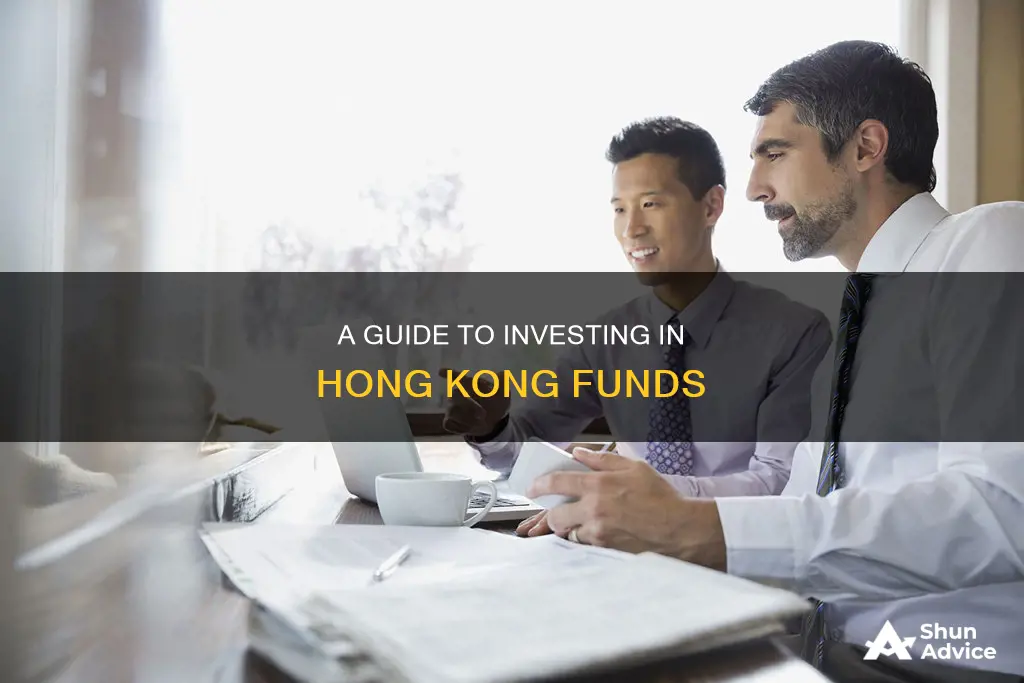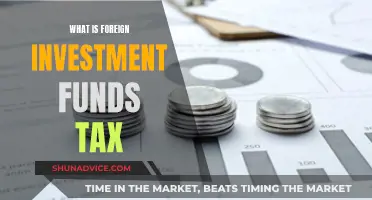
Hong Kong's stock market is one of the largest and most liquid markets in the world, and its status as a global financial hub makes it an attractive destination for investors. The Hong Kong Stock Exchange (HKEx) is known for its transparency, liquidity, and efficiency, and its proximity to mainland China provides investors with access to the world's second-largest economy.
There are several ways to invest in funds in Hong Kong, including through exchange-traded funds (ETFs), American depositary receipts (ADRs), and local or international brokers. When considering how to invest, it's important to keep in mind the associated risks and rewards, as well as your own risk tolerance and financial circumstances.
| Characteristics | Values |
|---|---|
| Hong Kong's stock market ranking | 5th largest stock exchange in the world |
| Market capitalisation | $4.4 trillion |
| Currency | Hong Kong dollar (HKD) |
| Primary financial regulator | Hong Kong Securities and Futures Commission (HKSFC) |
| Investment options | American Depository Receipts (ADRs), Exchange-Traded Funds (ETFs), Mutual Funds, Brokerage Accounts |
| Minimum shares to buy | Usually 100 shares or 1 lot |
| Tax advantages | Yes |
| Ideal investment portfolio composition | 20-40% of international stocks |
| Best brokers for Hong Kong stocks | HSBC Broking Services Limited, Interactive Brokers, Saxo Bank, Robinhood, E*TRADE |
| Commission charges | Fidelity Investments: $250 HKD ($32) per trade; Local Hong Kong broker: $8 HKD ($1) per trade |
| Investment risks | High volatility, currency risk, regulatory compliance |
| Investment tips | Diversification, long-term investment horizon, risk tolerance assessment |
What You'll Learn

Trading on the Hong Kong Stock Exchange
The Hong Kong Stock Exchange (SEHK) is the fifth-largest stock exchange in the world by market capitalisation and is an attractive option for investors looking beyond their domestic market. It is also a popular choice for companies seeking an initial public offering (IPO).
Hong Kong operates as a special administrative region (SAR) of China, allowing it to pursue its own economic policies, manage its own taxes, money, trade, foreign exchange, and currency (the Hong Kong dollar).
For investors based outside of Hong Kong, many of the stocks of the largest and best-capitalised Hong Kong companies listed on the SEHK can be traded on major U.S. stock exchanges through American depository receipts (ADRs).
How to Trade on the Hong Kong Stock Exchange
Open a Trading Account
To trade on the Hong Kong Stock Exchange, you will need to open a trading account with a reputable broker. You can choose a local brokerage account with a Hong Kong-based broker as a foreigner, but there may be restrictions for citizens of certain countries, such as the U.S. Brokers based outside the U.S. must register with the U.S. Securities Exchange Commission (SEC) and comply with the Foreign Account Tax Compliance Act (FATCA) to accept U.S. clients. This is why some Hong Kong brokers refuse to take on U.S. clients.
Fund a Trading Account
If you are based in Hong Kong, you will likely have a local bank account from which you can transfer funds to your brokerage account. For those based outside of Hong Kong, many brokers will allow you to open an account without a minimum deposit, but you will need to deposit funds before purchasing stocks. You will also need to provide identity documents and undergo a "know your client" (KYC) protocol to determine your level of financial markets experience.
Get a Trading Platform
After completing the above steps, you will have a funded stock trading account with either a Hong Kong-based or international broker. If you plan to trade online, you will need to obtain access to a trading platform supported by your chosen broker. Some platforms are web-based, while others need to be downloaded to your computer or mobile device.
Start Trading
With your trading account and platform set up, you can now begin buying Hong Kong stocks. Depending on your broker, you may be able to trade directly on the SEHK or through ADRs listed on U.S. exchanges.
Best Brokers for Trading in Hong Kong
For traders based in Hong Kong, HSBC Broking Services Limited provides a complete brokerage service for the SEHK and is regulated by the Hong Kong Securities and Exchange Commission (HKSEC). HSBC also offers other subsidiaries, including HSBC Broking Forex, HSBC Broking Futures, and HSBC Broking Securities.
Traders outside of Hong Kong can trade stocks directly on the SEHK through an account with major online brokers like Interactive Brokers or Saxo Bank. Interactive Brokers also offers the option of trading ADRs on Hong Kong stocks for reduced commissions.
Advantages of Trading on the Hong Kong Stock Exchange
Hong Kong's stock market has a reputation for being one of the most developed in Asia, and its proximity to mainland China provides investors with access to the world's second-largest economy. Hong Kong's status as a global financial hub and its strong regulatory framework make it attractive to foreign investors. The Hong Kong Stock Exchange (HKEX) is known for its transparency, liquidity, and efficiency.
Additionally, Hong Kong's currency peg to the U.S. dollar provides stability and predictability for investors, reducing currency risk. Overall, Hong Kong stocks can be a good addition to a well-diversified investment portfolio, offering the potential to capitalise on the region's economic growth and access a wide range of investment opportunities in Asia.
Cytonn Money Market Fund: Your Guide to Investing
You may want to see also

American Depositary Receipts
ADRs offer an easy, liquid way for investors to own foreign stocks, providing a means of diversifying their portfolios. They are just like stocks, traded on a stock exchange or OTC, making them accessible and easy to track and trade. Investors can purchase ADRs through American brokers, eliminating the need to go through foreign channels.
However, a drawback of ADRs is the potential for double taxation, both locally and abroad. Additionally, there is a limited selection of companies offering ADRs, and investors may incur currency conversion fees.
For investors in the US, ADRs provide a hassle-free way to own Hong Kong stocks, as they can be traded on the NYSE, Nasdaq, or OTC exchanges. While the choice is limited, with only a few Hong Kong stocks registered as ADRs on US exchanges, they offer a direct way to own foreign stocks.
How to Invest in Funds in Hong Kong
For those based outside of Hong Kong, many stocks of the largest and best-capitalized Hong Kong companies listed on the SEHK (Hong Kong Stock Exchange) can be traded on major US stock exchanges through ADRs.
To begin investing in Hong Kong stocks, you will need to:
- Open a trading account with a reputable broker, either in Hong Kong or elsewhere.
- Fund the trading account.
- Obtain a trading platform to support your trades.
- Start buying Hong Kong stocks, either directly on the SEHK or through ADRs listed on US exchanges.
It is worth noting that there are considerable hurdles for foreigners opening an account with a local Hong Kong broker, and some restrictions may exist for citizens of certain countries, such as the US.
Overall, Hong Kong stocks can be a good addition to a well-diversified investment portfolio, offering strong market fundamentals, a favourable regulatory environment, and proximity to China.
Mutual Fund Stocktrak: A Guide to Investing
You may want to see also

Exchange-Traded Funds
There are several ETFs available that specifically focus on Hong Kong, such as the iShares MSCI Hong Kong ETF (EWH) and the Franklin FTSE Hong Kong ETF (FLHK). These ETFs track different indices, such as the MSCI Hong Kong 25/50 Index and the FTSE Hong Kong Capped Index, respectively, and offer exposure to a range of mid-cap and large-cap Hong Kong-listed stocks.
When choosing an ETF, it is important to consider the investment strategy, liquidity, and assets under management (AUM). ETFs with low AUM may have lower liquidity, resulting in higher trading costs. For example, the iShares MSCI Hong Kong ETF (EWH) has an expense ratio of 0.50% and an annual dividend yield of 2.46%, making it a more expensive option compared to the Franklin FTSE Hong Kong ETF (FLHK). However, it is a much larger and more liquid fund.
In addition to the ETFs mentioned above, there are also sector-specific ETFs available in Hong Kong, such as those focusing on crude oil, China clean energy, and China treasury bonds. These ETFs offer investors a way to gain exposure to specific industries or themes within the Hong Kong market.
Overall, ETFs provide a straightforward and diversified entry point for investors looking to access the Hong Kong stock market, particularly for those based in the United States. They offer a balance between cost, risk, and ease of trading, making them a popular choice for those seeking exposure to Hong Kong's leading financial centre.
Hedge Funds: Why Institutions Invest and Their Benefits
You may want to see also

Choosing a brokerage platform
When it comes to choosing a brokerage platform to invest in funds in Hong Kong, there are a few things to keep in mind. First, you'll need to decide whether you want to work with a local Hong Kong broker or an international broker. Both options have their own advantages and restrictions.
If you choose to work with a local Hong Kong broker, you may be able to save on commission fees. For example, local brokers typically charge lower fees per trade compared to international brokers. However, there may be restrictions on citizens of certain countries, such as the US, when working with local Hong Kong brokers. This is because stock brokers based outside of the US must be registered with the US Securities Exchange Commission (SEC) and comply with the Foreign Account Tax Compliance Act (FATCA) to accept US clients. As a result, some local Hong Kong brokers may refuse to take on US-based clients.
On the other hand, if you choose to work with an international broker, you may have easier access to trading Hong Kong stocks through American Depository Receipts (ADRs) on US exchanges. Some international brokers, such as Robinhood and E*TRADE, offer commission-free trading in stocks and ADRs traded on US exchanges, which can include ADRs of some Hong Kong stocks. International brokers may also be a good option if you want to trade on multiple international exchanges, as they often provide access to various global markets.
When selecting a brokerage platform, it's important to research the broker thoroughly. Check the account type (discretionary or non-discretionary), the commission structure, and the regions and countries covered. If you're based in the US, look for brokers registered with the SEC and members of the Securities Investor Protection Corporation (SIPC) and the Financial Industry Regulatory Authority (FINRA).
Some reputable brokerage firms that offer international access to the Hong Kong stock market include Interactive Brokers, E*TRADE, Fidelity Investments, and Charles Schwab. HSBC Broking Services Limited is also an option for traders based in Hong Kong, providing a complete brokerage service for the Hong Kong Stock Exchange (SEHK) and regulated by the Hong Kong Securities and Exchange Commission (HKSEC).
It's worth noting that you may be able to trade select Hong Kong stocks using ADRs listed on US exchanges without a broker, as some brokers offer commission-free trading for these. However, if you want to trade directly on the SEHK or access a wider range of Hong Kong stocks, working with a broker is usually necessary.
Arbitrage Funds: A Smart Investment Strategy for Asian Investors
You may want to see also

Understanding market trends
Market Trends and Analysis
Hong Kong's stock market is one of the largest and most liquid markets globally, attracting investors worldwide. The Hong Kong Stock Exchange (SEHK) ranks as the world's fifth-largest stock exchange, with a market capitalization of $4.4 trillion. The SEHK's oldest and main stock market index is the Hang Seng index, comprising 50 of the largest companies listed on the exchange.
Regulatory Environment
Hong Kong has a strong regulatory framework, with the Hong Kong Securities and Futures Commission (HKSFC) overseeing trading in the local stock, forex, and contract for difference (CFD) markets. Hong Kong's status as a global financial hub and its efficient, transparent, and well-regulated exchange make it attractive to foreign investors.
Currency Considerations
Hong Kong's currency, the Hong Kong dollar (HKD), is pegged to the US dollar, providing stability and predictability for investors. This currency peg reduces currency risk and enhances the appeal of investing in Hong Kong stocks.
Sector Allocation
The financial sector dominates equity concentration in Hong Kong stocks, with 539 stocks and a market capitalization of over $2.3 trillion. Other sectors include technology services, retail trade, health technology, and consumer and non-consumer durables.
Trading Mechanisms
All trading on the Hong Kong exchange is done electronically via the Automatic Order Matching and Execution System (AMS), which was upgraded in 2000. The AMS facilitates trading in warrants, commodities, currency pairs, and fixed-income products.
International Investment Options
For foreign investors, there are several options to invest in the Hong Kong market, including American Depository Receipts (ADRs) and Exchange-Traded Funds (ETFs). ADRs allow investors to purchase stocks in foreign companies through US exchanges, while ETFs provide diversification and ease of trading without currency risk.
Tax Advantages
Trading stocks in Hong Kong offers notable tax advantages, providing an attractive venue for investing in Mainland China stocks.
By staying informed about market trends, regulatory changes, sector performance, and investment options, investors can make more strategic decisions when entering the Hong Kong stock market.
Mutual Fund Wealth: Secrets to Getting Rich
You may want to see also
Frequently asked questions
The simplest way to invest in Hong Kong securities is through exchange-traded funds (ETFs). This method provides diversification and ease of trading without the currency risk. Examples of ETFs in this category include iShares MSCI Hong Kong ETF and Franklin FTSE Hong Kong ETF.
Non-residents can trade Hong Kong stocks by opening an account with a brokerage firm that offers an international trading platform. Alternatively, investors can purchase a limited number of Hong Kong stocks listed as American depositary receipts (ADRs) on the New York Stock Exchange, Nasdaq, and over-the-counter exchanges.
Hong Kong stocks can be a good investment for several reasons. Hong Kong has one of the most developed stock markets in Asia and its proximity to mainland China provides investors with access to the world's second-largest economy. Additionally, Hong Kong's status as a global financial hub, its strong regulatory framework, and its currency peg to the US dollar enhance its attractiveness for foreign investors.







